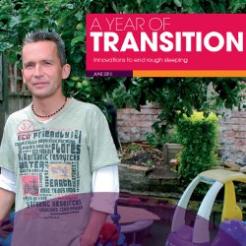Commissioners must focus on long-term homelessness and draw multiple agencies together to provide tailored support, according to a report outlining the lessons from the first projects supported by the Homelessness Transition Fund.
The report, released today, looks at the first-year results of 41 projects from the 120 voluntary organisations which shared £16m funding to tackle homelessness. It finds that 63 per cent of those assisted by the funding, awarded as part of the ‘No second night out’ government initiative, had been homeless for less than six months. Just 7 per cent of those supported were long-term rough sleepers, while 14 per cent were helped before they had to sleep rough at all.
The report shows that the funding surpassed its estimates of supporting 10,156 people by 20 per cent. But it found that the most challenging beneficiaries – the long-term homeless who require a multitude of services which may include healthcare, addiction support or criminal justice support as well as housing - are falling through the cracks.
“It is essential that work is targeted at long-term rough sleepers, as well as those who have recently arrived on the streets,” advise the report’s authors, umbrella body for homelessness support organisations and shepherds of the Homelessness Transition Fund, Homeless Link.
“The work involves a greater effort to build trust, and it is often necessary to engage additional support services before someone who has lived on the streets for a long time will accept the help to bring them into accommodation,” they continue.
Commissioners' roles are essential
Homeless Link advises that people come into contact with many agencies before and during homelessness, and a more joined-up approach could both prevent and heal homelessness. The organisation advises that commissioners’ role is vital in ensuring that the long-term homeless can move into accommodation. They “should avoid a ‘one size fits all’ approach”, and instead adopt a ‘partnerships by default’ model to commissioning services, bringing together a range of services in collaboration in order to provide tailored support to individuals.
Some £8.03m was awarded to the first 41 projects, which spent an average of £89,598 totalling £3.7m in their first year. A total of 12,235 people were supported in projects which worked towards the no second night out principle, as well as the ideals that no one should make their home on the streets; no one should return to the streets, and no one should arrive on the streets. The overall results in the first year showed that 94 per cent of those supported were still in services such as temporary accommodation or living independently at the end of the first year.
The report found that overall the most effective projects not only provided tailored support through partnerships, but used trained staff or volunteers and kept in contact with beneficiaries. The report recommends that commissioners look to support project which are able to demonstrate results to find projects that really work.
Organisations interested in Homelessness Transition Funds can find out more here.

| Want access to all civilsociety.co.uk content?Subscribers gain access to all expert advice, analysis, surveys, special reports and the full archive of content from as little as £43.20 per year. Find out more... |










